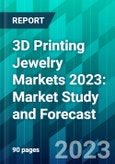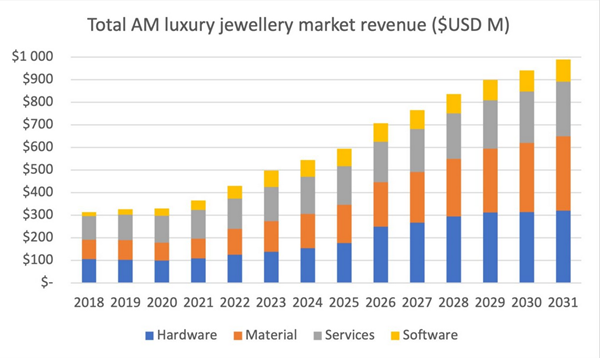3D Printing Jewelry Market to Be Nearly a $1B Opportunity in 2031
The comprehensive market study indicates that the market for 3D printed jewelry will reach $989M in 2031 compared with $489M this year, with a 10 year CAGR of 10% from 2021 to 2031.
Despite well over a decade of additive adoption, the jewelry industry’s 3D printing landscape has been relatively concentrated on a small number of specialist providers. However, in recent years, several factors have reinvigorated the market and opened up avenues for growth, innovation and competition. The most intriguing development for the AM jewelry space is the direct production of precious metal jewelry, with multiple vendors of metal binder jetting systems signaling their intent to provide comparatively low-cost precious metal printing, which will turn the historical high-cost direct jewelry market upside down and set the stage for direct metal jewelry production to go mainstream.
This report focuses on the current and future state of the 3D printing luxury jewelry market, focusing on the major trends both on the consumer side as well as technology side that are likely to disrupt this market space in the coming years. The report explores in detail the technology landscape for both polymers and metals in the production of jewelry patterns, molds and directly printed jewelry, profiling the major and notable AM technology and materials vendors, their competitive position and their relevant offerings and systems. This report also provides a comprehensive 10 year forecast of the AM jewelry market, forecasting AM hardware, materials, software, and services.
Some of the major vendors profiled in this report include: ETEC (EnvisionTEC/Desktop Metal), 3D Systems, Digital Wax Systems (DWS), Desktop Metal, Hewlett Packard, SolidScape, Formlabs, EOS, GE Additive, and Sisma.
The analyst’s reports on the 3D printing industry have become adopted across the entire AM industry by companies looking for an off-the-shelf source of detailed market data and forecasts, with critical insights on leading market sectors and commentary on industry dynamics.
Key Highlights
- The leading 3D printed jewelry applications in today’s market are the production of investment casting patterns.
- Growth is forecast in part due to technology vendors adapting large format systems for these applications, allowing users to optimize for scale.
- The emergence of direct precious metal printing of jewelry through metal binder jetting systems is anticipated.
- The explosion of high-resolution, low-cost VAT based printers is set to disrupt the marketspace, greatly reducing the cost-barrier to entry.
Table of Contents
Chapter One: 3D Printing Jewelry Market History, Trends and Opportunities
1.1 3D Printing’s Long-established History in the Jewelry Space
1.1.1 The Use of 3D Printing in the Production of Investment Casting Patterns
1.1.2 3D Printing Patterns Supporting Vulcanized Mold Production
1.1.3 Directly-printed Jewelry
1.1.4 Design and Fit Verification Models
1.2 Current Product Space for 3D Printing
1.2.1 Rings, Earrings, Pins, Cufflinks and Other Small Accessories
1.2.2 Timepieces and Watches
1.2.3 “Smart” Accessories and Wearable Technologies
1.2.4 “Meta-verse” Jewelry
1.2.5 Jewelry Joins the NFT Hype
1.2.6 COVID Impact of Labor Availability and Material Availability and Costs
1.3 Evolution of 3D Printing Hardware
1.3.1 Changes in the Global Jewelry Industry Pose Challenges to Stakeholders: Consolidation, Rise of E-Commerce
1.3.2 Continuing Price Reduction in Polymer 3D Printers, Reducing Barrier to Entry and Improving Printing Economics
1.3.3 High-speed Polymer Printing Technologies Increasing Competitive Advantage for Larger Production
1.3.4 Innovations in Metal Binder Jetting Set to Allow for Mass Production of Direct Precious Metal Parts
1.3.5 Access to Low-cost Metal 3D Printing Through Bound Metal Filament Printing
1.4 Trends in the 3D Printing Jewelry Space
1.4.1 Low-cost Printing Systems Enabling Studios and Designers to Access the Technology and Incrementally Scale Capacity
1.4.2 Continuing and Growing Investments and Innovations In Precious Metals for 3D Printing
1.4.3 Developments in 3D-printed Jewelry Software and Design Tools
1.5 Primary Applications and Strategic Opportunities For 3D Printing Across the Jewelry Value Chain
1.5.1 Compression of Traditionally Analogue and Craft Processes
1.5.1.1 Directly Printing Investment Casting Patterns
1.5.1.2 3D-printed Patterns for Mold Production
1.5.1.3 Directly 3D-printed Pattern Molds
1.5.2 Development of Custom Retail Platforms
1.5.3 Mass Customization of Premium Jewelry
1.5.4 New Stylistic Opportunities Through Geometric Complexity
Chapter Two: Polymer 3D Printing Hardware and Materials Guide to the Jewelry Market
2.1 Vat Photopolymerization and Material Jetting Technologies Used in Pattern Fabrication
2.1.1 Material Jetting Technologies
2.2.2 Material Jetting of Castable Wax Patterns
2.2.3 Vat Photopolymerization Technologies
2.2.4 SLA, DLP, LCD, Continuous 3D Printing
2.2.5 Notable Vendors and Platforms in the Vat Photopolymerization Space
2.2.6 Vat Photopolymerization Materials
Chapter Three: Metal 3D Printing Hardware and Materials Guide to the Jewelry Market
3.1 Review of Metal Technology Vendors
3.2 Emergence of Binder Jetting Technologies for Precious Metal Printing
3.2.1 Materials
3.2.2 Gold
3.2.3 Silver
3.2.4 Platinum
Chapter Four: Ten-year Forecast of the 3D Printing Jewelry Market by Hardware, Materials, Services and Software
4.1 Ten-year Forecast for 3D Printing Hardware Shipments and Revenues
4.2 Hardware Growth
4.3 Materials
4.4 Polymer Materials Market
4.5 Metal Materials
4.6 Services and Software
About the Analyst
Acronyms and Abbreviations Used In this Report
List of Exhibits
Exhibit 1-1: Market Share of Polymer Materials by Weight (kg)
Exhibit 1-2: Value Proposition Matrix for 3D Printing Within the Jewelry Market
Exhibit 1-3: Traditional vs. 3D Printing Investment Casting Process Chain
Exhibit 2-1: Comparison of Capabilities and Limitations of Different Modes of Jewelry Pattern Fabrication
Exhibit 2-2: Relevant Material Jetting Vendors and Platforms
Exhibit 2-3: Relevant Material Jetting Materials (of Note and Relevance)
Exhibit 2-4: Comparison of SLA, DLP, MSLA (LCD) Printing Methodologies
Exhibit 2-5: Vat Photopolymerization Vendors and Platforms (of Note and Relevance)
Exhibit 2-6: VAT Photopolymerization Materials Vendors and Platforms (of Note and Relevance)
Exhibit 3-1: Vat Photopolymerization Vendors and Platforms (of Note and Relevance)
Exhibit 3-2: Vat Photopolymerization Materials Vendors and Platforms (of Note and Relevance)
Exhibit 4-1: Total AM Jewelry Market Revenue
Exhibit 4-2: Total AM Jewelry Market Share
Exhibit 4-3: Total Jewelry Market YoY Growth
Exhibit 4-4: Hardware Sales by Technology Type
Exhibit 4-5: 3D Printing Hardware Revenue Market Share
Exhibit 4-6: YoY Hardware Growth
Exhibit 4-7: Polymer Hardware Revenue by Type
Exhibit 4-8: Polymer Hardware Units Sold
Exhibit 4-9: Polymer Hardware Market Share
Exhibit 4-10: Metal Hardware Revenue
Exhibit 4-11: Metal Hardware Units
Exhibit 4-12: Material Revenue
Exhibit 4-13: Material Shipments by Kg
Exhibit 4-14: Material Market Share
Exhibit 4-15: YoY Material Growth
Exhibit 4-16: Polymer Material Revenue
Exhibit 4-17: Metal Materials Revenue
Exhibit 4-18: Services Revenue
Exhibit 4-19: Software Revenue
Companies Mentioned (Partial List)
A selection of companies mentioned in this report includes, but is not limited to:
- 3D Systems
- Desktop Metal
- Digital Wax Systems (DWS)
- EOS
- ETEC (EnvisionTEC/Desktop Metal)
- Formlabs
- GE Additive
- Hewlett Packard
- Sisma
- SolidScape









